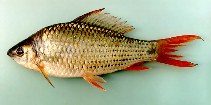| Family: |
Cyprinidae (Minnows or carps), subfamily: Labeoninae |
| Max. size: |
32 cm SL (male/unsexed) |
| Environment: |
benthopelagic; freshwater; pH range: 6.5 - 7; dH range: 5 - 8; depth range - 5 m, potamodromous |
| Distribution: |
Asia: Mekong and Chao Phraya basins, Malay Peninsula, Sumatra, Java and Borneo (Ref. 27732). Reported from Salween and Maeklong basins (Ref. 26336); China (Ref. 9671); and lower Myanmar (Ref. 4832). |
| Diagnosis: |
Dorsal soft rays (total): 17-19; Anal soft rays: 8-8. Distinguished from the other species of the genus in having 12-18 branched dorsal rays; 6-9 rows of spots along scale rows (not always distinct), and a large round blotch on the caudal peduncle (Ref. 27732). No black midlateral stripe; sometimes with a spot above a pectoral fin (Ref. 12693). |
| Biology: |
Adults occur in all type of habitats, but usually associated with large streams with slow current and muddy to sandy substrate (Ref. 27732). They migrate from river to flooded areas during the onset of the flood season and returns to river habitats at the end of that period (Ref. 37770). Juveniles are usually seen first in August, they move back to permanent water as flooded lands dry up. Back in the rivers they are attached to brush piles, tree roots and other solid objects (Ref. 12693). Adults feed on roots of plants (Hydrilla verticillata), unicellular algae and some crustaceans. Most abundant fish in Nam Ngum reservoir where it is captured with large dip nets set on rafts. Good flesh but bony and used for lap pa or grilled (Ref. 6459). Marketed fresh or used to make prahoc (Ref. 12693). |
| IUCN Red List Status: |
Least Concern (LC); Date assessed: 18 April 2020 Ref. (130435)
|
| Threat to humans: |
harmless |
Source and more info: www.fishbase.org. For personal, classroom, and other internal use only. Not for publication.

